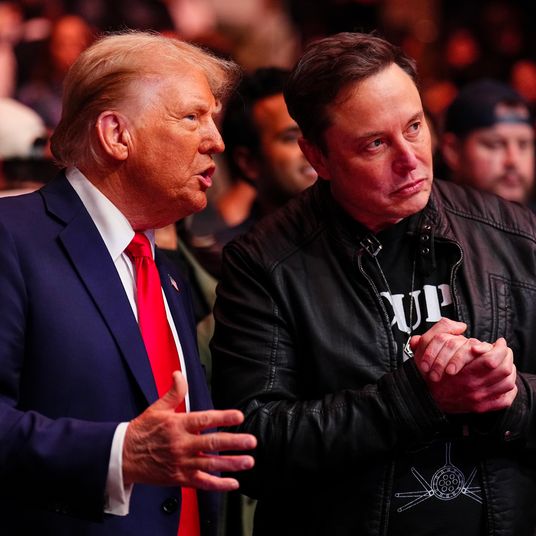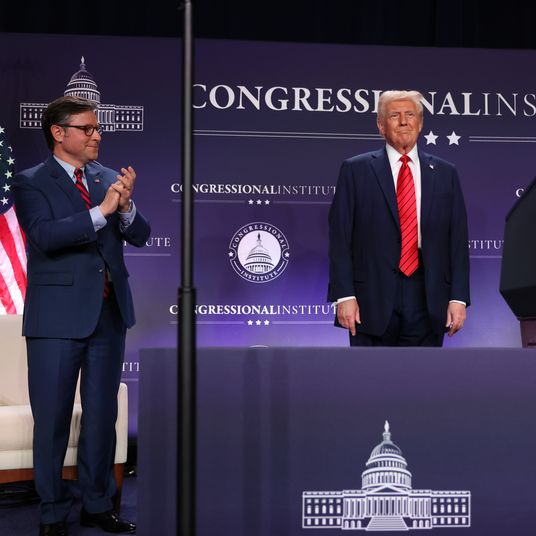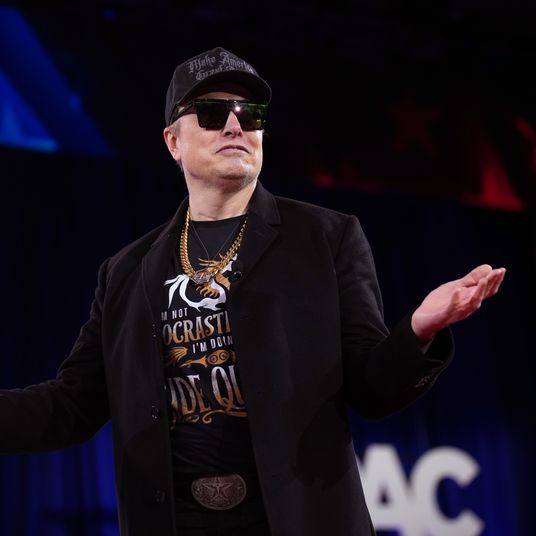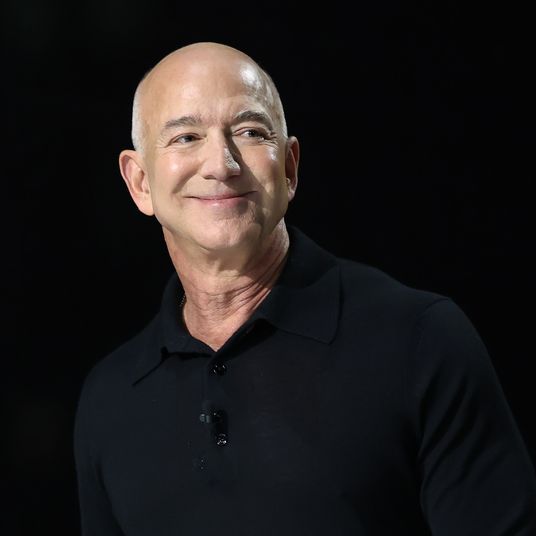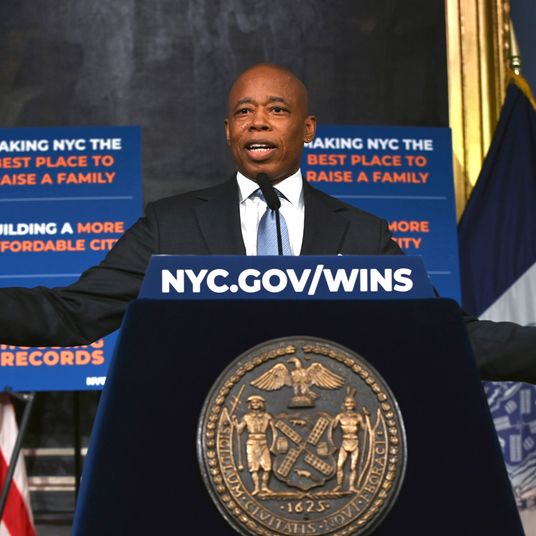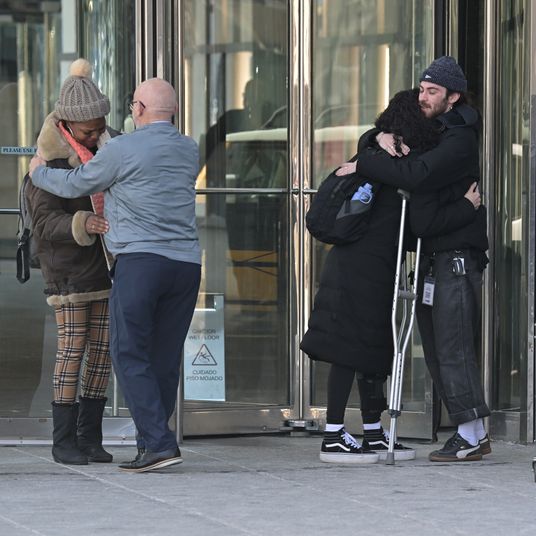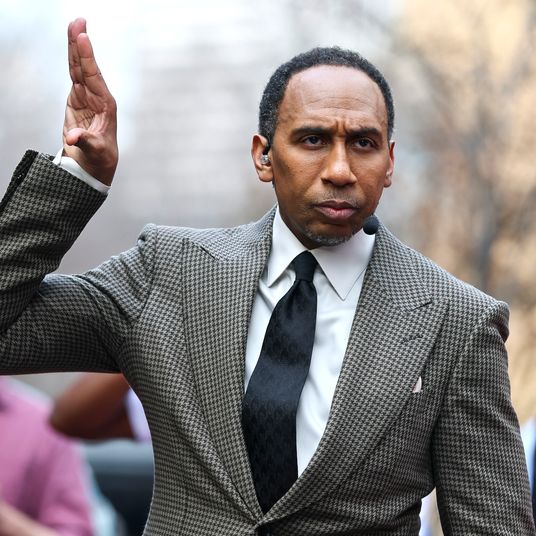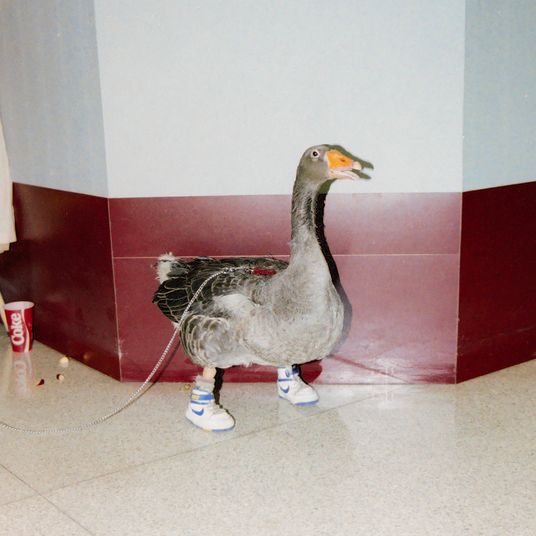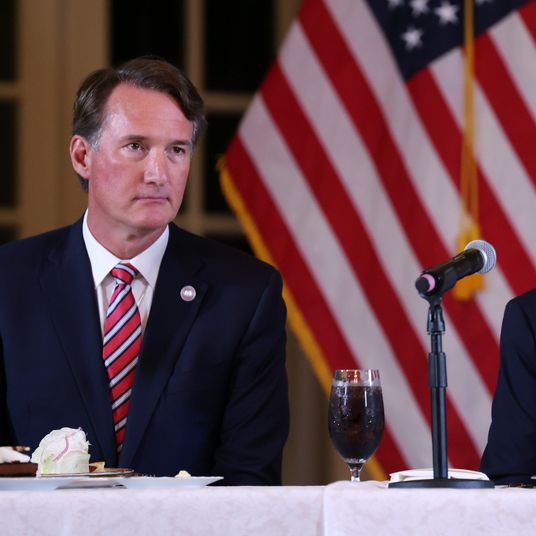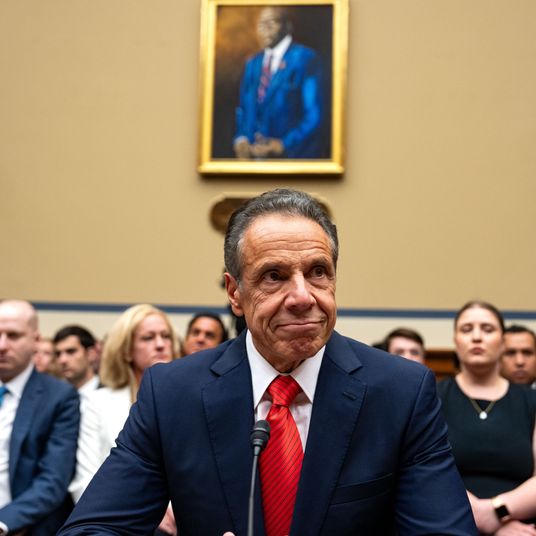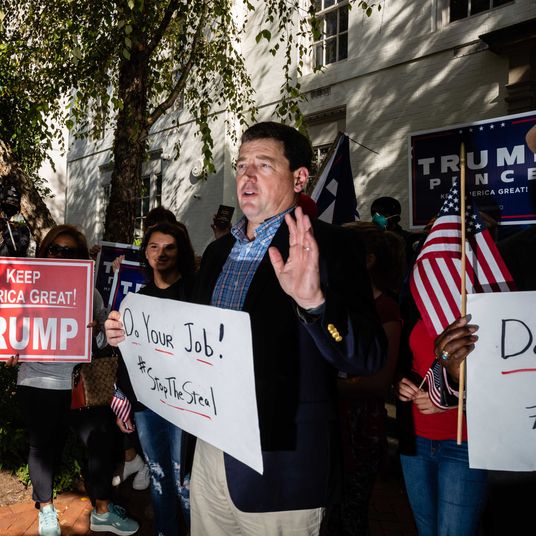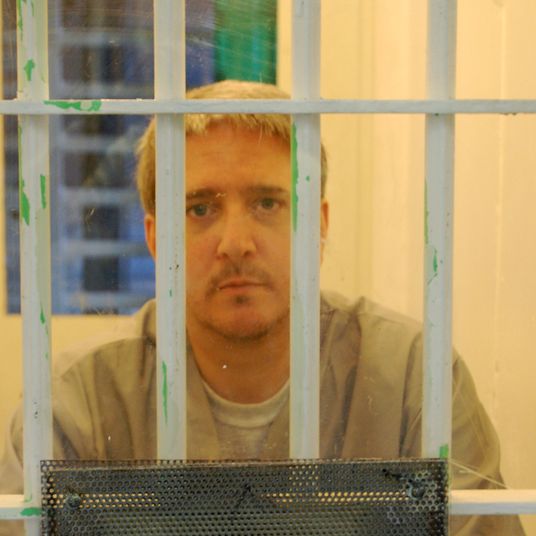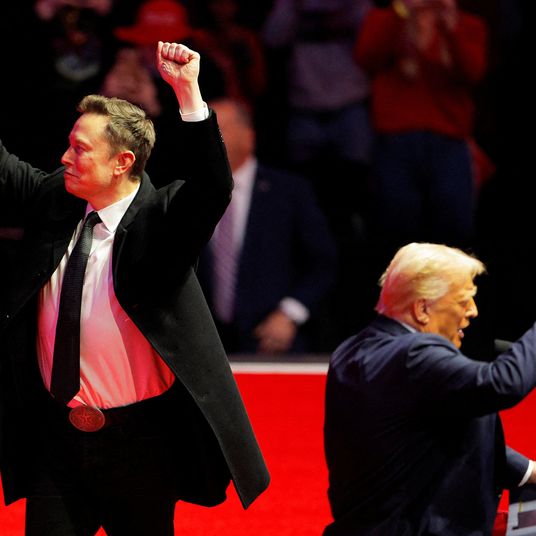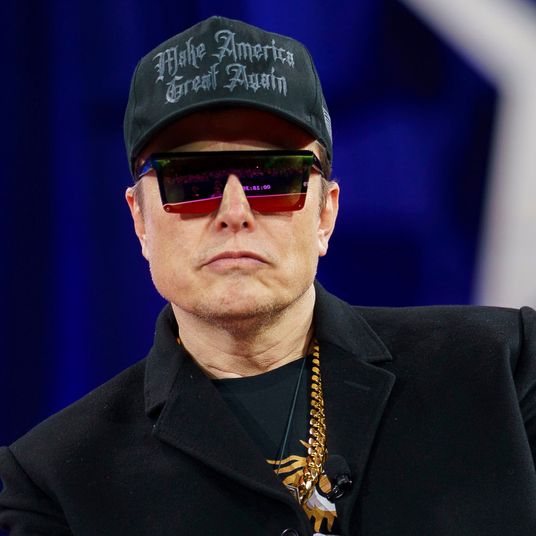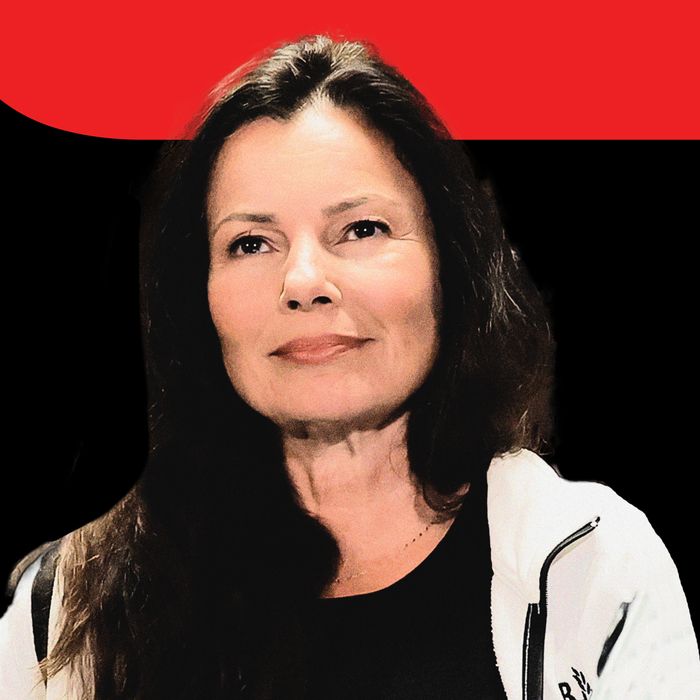
For the first time since 1960, both Hollywood writers and actors are on strike, shutting almost the entire industry down. While the writers’ strike was long-anticipated, many were surprised that negotiations between SAG-AFTRA and studio executives broke down — and by the suddenly bitter rift that developed between the two sides. The union’s anger at what it considers insulting offers from its counterparts is personified by SAG-AFTRA president Fran Drescher, familiar from the ’90s hit sitcom The Nanny, as well as other roles. Last week, Drescher gave an impassioned and impromptu speech after the strike got underway, saying that she was “shocked by the way the people that we have been in business with are treating us.” In the latest episode of On With Kara Swisher, Drescher explains how she became leader of the union, why the actors are holding firm in their demands, and what the endgame of the strike might look like.

On With Kara Swisher
Subscribe on:
Kara Swisher: Welcome, Fran. You’ve had a busy week, I suspect. Just FYI, you can say the line “the jig is up” three times. So be careful of when you want to use it, but please feel free to use it. I actually enjoy that tagline, and I also enjoyed your Titanic reference. But speaking of Titanic, why did you want to be president of the guild in the first place at such a turbulent time, when the economics are changing so drastically from when you had a hit show?
Fran Drescher: It wasn’t something that I was chasing, but I do live by “life unfolding,” which I think is a healthier way to live than always trying to pursue something that’s just out of your grasp. And so this was presented to me and I gave it some long and hard consideration. I shouldn’t say long, because they rarely say, “We have to know in like three days.” And I said, “Well, this, let me just think about it,” because I knew it was gonna be a major commitment, but the more I thought about it, the more I realized that it was an opportunity for me, because all of my individual accomplishments throughout my career can be focused on this job and and allow me to help this union and bring everything that I’ve worked so hard at into fruition in this one defining moment.
Did I know there was going to be a strike? No. Did I know how dysfunctional the union was and how much it was like a microcosm of everything that’s wrong with our Über-partisan Congress? No. But I did say that I think I might be more radical than the party that was recruiting me.
Kara Swisher: Right. They recruited you — why? Had you been an activist or …
Fran Drescher: In other fields, yes. I got a bill passed in Washington by unanimous consent. I was appointed public diplomacy envoy for the U.S. State Department. I created and executive-produced The Nanny. I founded a nonprofit. I’ve written two New York Times best sellers. I’m a public speaker. I mean, for myriad reasons, I qualified for the job.
Kara Swisher: Oh, I don’t think you’re not qualified. I’m just curious why they came to you.
Fran Drescher: Well, you know, that’s part of it. They actually went to Rosie O’Donnell at first, or maybe, I don’t know, maybe tenth — I have no idea how many people ’til I ended up with the opportunity. But when they asked Rosie if this would be something that she would be interested in, clearly they were going after somebody that would elevate the union by leveraging their celebrity — their high profile, I should say. She said, “It’s not for me, but I know who would be great at it. She’s the smartest woman I know. Go talk to Fran Drescher.” And that was when I got the call that changed everything.
Kara Swisher: Let’s get to the lead-up to the strike, the first in 63 years of both the unions. You said in your press conference that you went in earnest to negotiations, and you did sound positive at the start. Why was that?
Fran Drescher: Well, because we started with peripheral issues. And I think in hindsight, that was by design on their part. They kind of lumped together different things and said, “Can we deal with this chunk first? To us it feels like they’re all a little related to each other. And let’s just start here.” And it’s like, okay, we’re gonna have to get through everything. And Duncan made a point of saying —
Kara Swisher: Explain who Duncan is.
Fran Drescher: Duncan Crabtree Ireland is our national executive director and also our chief negotiator. And he and I work together running the union.
Kara Swisher: So he said what about that, about going around the edges?
Fran Drescher: He said, “Please don’t underestimate our resolve. There are core issues here that are not gonna go away and that we’re not gonna walk away from.” So we started with some of these peripheral things and felt like we were making headway.
Kara Swisher: Animal safety, I saw — a bunch of little and big things.
Fran Drescher: Even that was oddly a little bit of a push, but that was when I felt, “Okay, well, we’re at least moving.” It’s a give-and-take and it’s working, and I felt somewhat optimistic. But then as we whittled away and got closer and closer to the core issues, the deal-breakers, we were really stonewalled, or we got back so little that it was insulting.
Kara Swisher: What specifically happened? When you say “stonewalled” — they just didn’t return your calls, or they walked out?
Fran Drescher: That was during the extension. They gave us an unusually small window, the smallest window we’ve ever had to negotiate a very large contract that represents a lot of different career paths. So by the time the contract ran out on June 30, We felt, “Let’s see if we can avert a strike.” Nobody wants a strike. It’s just, we’re at that breaking point where if we don’t get a contract that respects and honors us, we’re gonna have to strike. But in earnest, let’s extend the longest extension that we’ve ever given in any negotiation. That was when they kept canceling our negotiating appointments and locked themselves behind closed doors.
And I kind of thought, Well, maybe they’re duking it out. Maybe there are people in there fighting for us and other people not wanting to. And then when they finally surfaced, they had nothing. I mean, it was shocking. What were you canceling over? What was going on there?And I think in a way we might have been duped, so that they could buy —
Kara Swisher: Duped — because they deny that they did that. They deny that they —
Fran Drescher: Whatever. Meanwhile, they got another week out of us to promote their summer movies, okay? And they had the nerve, when the extension expired, that they wanted us to extend again. And I said, “After that lousy performance you gave us?”
Kara Swisher: Yeah, no. Were you speaking with the WGA during the breakdown in negotiations? Did that impact your decision?
Fran Drescher: I think Duncan was in conversations with them. I do not think that impacted our decision whatsoever. I’m happy for them that they have this kind of renewed energy, because they’ve been walking the picket lines for over two months. But, you know, we complement each other. We are not the same. We have different needs and we try and individually go for the best contract that we can, and neither one of us is willing to sell out this time.
Kara Swisher: I want to play a clip to get into this, because the one thing that struck me in this stemwinder of a press conference that you gave is the tone that you had, of indignation. Let’s play this clip first:
FRAN DRESCHER: And so it came with great sadness that we came to this crossroads, but we had no choice. We are the victims here. We are being victimized by a very greedy entity. I am shocked by the way the people that we have been in business with are treating us. I cannot believe it, quite frankly, how far apart we are on so many things. How they plead poverty, that they’re losing money left and right when giving hundreds of millions of dollars to their CEOs.
Kara Swisher: This is quite a speech — that was just one part of it. But loaded words: victim. At the end of that, you said it’s disgusting. You brought in Wall Street and greedy entity. You’re not unsophisticated people when dealing with this — you have lawyers and agents. What’s the strategy here? Is this directed at your own troops or the general public?
Fran Drescher: I did not know I was going to make a speech. They had teleprompters and something typed. I glanced down at it and I said, “I have to speak from the heart.” And our chief of communication said, “You do whatever is good for you.” And that just came out of my mouth. All of that just came out of my mouth. So, you know, I live my life differently. I’ve been in leadership. I’m a boss. I employ people, but always with respect and honor. This is the way I just am. I come from a very humble and provincial background. When I was a small child, my dad worked two jobs. So to me, you honor the people that work for you. You make them feel respected. You give them a piece of the pie, so it’s not this mentality of marginalizing you and squeezing you out of every last dime.
I looked at those people across the table and I thought, What is this business you are in? How do you sleep nights? Your whole job is to screw us. When we are the foundation of your business!
Kara Swisher: Were you surprised, though? In terms of that having been the boss, having been in Hollywood — you’re not an ingenue who doesn’t understand this. So you were surprised by this kind of attitude? You didn’t think they thought that of you, presumably.
Fran Drescher: Oh, not that they didn’t think that of me, but that they thought that this wasn’t going to be a seminal negotiation when the industry has changed so dramatically, with all of this AI, streaming, digital, all of it. So I was surprised that they gave us so much pushback when, to me, it makes perfect sense that if you’re gonna change the business model —where’s the big surprise that the contract has to change too? We’re dealing with a contract that’s structure was created in 1960!
Kara Swisher: Yeah, it’s a different industry.
Fran Drescher: It’s a different world!
Kara Swisher: Indeed it is. You were talking about inequity — let me read a quote from Lainey Gossip, which is one side of this: “They’re not here to negotiate in good faith and work towards a solution where everyone gets their piece of the pie. They want the whole pie, they want the pie shop, they wanna turn screenwriting into Uber and acting into DoorDash. The end goal is for Hollywood to become a strict gig economy where labor is reduced to on-demand services for pennies. Yet corporations and the men who run them get even richer as everyone else starves around them.”
Do you think they want to turn screenwriting into Uber and acting into DoorDash and make you all gig workers, or a lot of you?
Fran Drescher: I think the bottom line, in what is a collaborative art form, is getting more shareholder money by getting more subscribers. That is, at the core, what the issue is. And then you’ve got the CEO that gets massive bonuses with shareholder success. So it’s very tied in with Wall Street. And it has turned its back on the creative people that are foundational to the business. I can’t really speak to if we’re all gonna be — that’s not my vernacular. All I can say is that we stand at a time when big business feels like it’s okay to marginalize people and systematically squeeze them out of their livelihood while those at the top are fat cats and the shareholders and major and minor investors are also getting rich off of the backs of the people that actually are the product.
I would never think that way. I would have the courage, and character I might add, to walk into the boardroom and say, “This is wrong. This is not the way to build an empire. This is unsustainable. They are so key to who we are and what this business is. It behooves us to be inclusive and make them happy.” And I have proved that as an executive producer and as an employer over and over again.
Kara Swisher: So you’ve made this about a bigger labor struggle and cast it as this worker-plutocrat fight. Let’s play this clip — I thought it was very important what you said:
FRAN DRESCHER: The eyes of the world, and particularly the eyes of labor, are upon us. What happens here is important, because what’s happening to us is happening across all fields of labor, by means of when employers make Wall Street and greed their priority and they forget about the essential contributors that make the machine run.
Talk about that, because it’s an emotional appeal, it’s a class appeal, it’s a financial appeal. Sometimes these things can backfire. How do you think about using that?
Fran Drescher: It is what it is. It’s not “sometimes these things can backfire.” I’m not manipulating anything. It’s really obvious what’s happening, and it’s happening everywhere. I was in Santa Monica, and there was a little box on wheels delivering stuff, and I thought to myself, That used to be a person on a bicycle, what happened to that person?
When I make an airline reservation, I’m going through a robot all the time and I keep saying, “I want to speak to a person, I want to speak to a person.” Until I finally get to a human being, and nine out of ten times, they’re not even American. When I get an American, I find them to be excellent at what they do, and the company should hire more of them. But I think this is something that’s happening everywhere and it’s like the frog in the water. You’re not even realizing that before we know it, we’re cooked.
Kara Swisher: When you talk about the pay of the executives, I get why you’re doing it. You use Bob Iger of Disney as an example. Most of his compensation of that $27 million is stock grants based on performance. And you’re saying —
Fran Drescher: That’s a conflict of interest.
Kara Swisher: Tell me why that is. And should actors own stocks so that they’re all in the same boat that way, the way start-ups in Silicon Valley do? They are all in the same boat in that regard.
Fran Drescher: First of all, nobody that makes $78,000 a day should talk to us about what’s realistic. That’s the first order of business. The second thing is when his fortune is tied so heavily to stock performance — it should be tied to how he runs the company, what the general psyche of the company is, and the feeling of everybody in it.
He’s a certain type of personality that is gonna put his own personal wealth and ambitions over doing the right thing. Do the right thing. How much money do you need? You’re gonna be the richest one. Isn’t that enough? Without taking the food off the table of the journeyman performer? It’s like — I don’t even know who these people are or how they think.
Kara Swisher: The reason I’m asking this is do you think actors and writers should own parts of these companies the way start-ups in Silicon Valley do? Everyone owns the company there.
Fran Drescher: I think that our new structure with this new business model should be tied to subscriptions. For me, the stock market should have a big casino sign above it with flashing lights. That’s not my jam. If the business model that has so significantly changed. Our industry is tied so heavily to subscribers, so we need in on that pocket. And we’ll figure out who gets what. But we’re building this platform and all they want to do is keep looking at the pocket that they keep reducing, reducing, reducing.
Kara Swisher: The residuals.
Fran Drescher: Residuals based off of much shorter episodics, much shorter series and seasons, and no tail — no syndication, no nothing. It’s not the place to really have a meaningful bargain.
Kara Swisher: I’d like you to stack-rank the specifics of this three-year deal. Let me do it first. I think the first is economics — residuals and wage increases. The second is various working conditions, and the third for me is AI, because it’s still unknown and we are not gonna know the impact well beyond three years. How do you look at it? I would assume the economics is at the top of your list.
Fran Drescher: You know, AI is a very serious concern. I don’t think that there is a top, I think everything has to be dealt with and nothing can be neglected. It’s gonna be a seminal negotiation, and they’re not gonna want to do it because they wanna give away ice in winter. “That’s all you get. And not even that much.”
Kara Swisher: Okay, so let’s start with the residuals — how to replace residuals, because that’s really what’s happening.
Fran Drescher: Well, we’re not entirely wanting to replace residuals. We’d like the caps to be raised, but there isn’t enough product and enough earnings of it and enough tail to it to compare to what it was based off.
Kara Swisher: Right. Netflix, for example, pays residuals, but they’re much smaller and they diminish over time.
Fran Drescher: And we don’t have any transparency about how they’re coming up with these numbers. We have to what — believe them?
Kara Swisher: Yeah, exactly. Years ago I talked to the guy who ran Modern Family. He didn’t get numbers, and that was a big hit show. But I’m curious — what you made for The Nanny — can you compare and contrast that to today?
Fran Drescher: The Nanny was the old business model, which actually very successfully shared the wealth with all the above-the-liners. Each season, we might do 28 episodes. Now you’re lucky if you get ten, so that’s two-thirds less. We would go six, seven, nine, ten seasons if a show was considered successful.
Now it’s limited to three or four seasons, and then that’s it. They came up with the term “limited series.” The old model was predicated off eyeballs and ad dollars. And as long as those two things were there, it stayed on the air. Longevity was the name of the game. And after it ran on broadcast television networks, it went into syndication, it went on cable, it went around the world, and it kept making money. So whether you were a regular or a guest, it didn’t matter. You would always get a little residual in your mailbox. And that was a thing that kept people going. But why did you get their residual? Because the studio kept making money.
Kara Swisher: Are you still making money from The Nanny?
Fran Drescher: Yes, I am.
Kara Swisher: You are. Through residuals?
Fran Drescher: Well, I created it also. So that’s a different kind of ownership.
Kara Swisher: Is it on a streamer right now?
Fran Drescher: It is. It’s on Max.
Kara Swisher: And do you get the old residuals even though it’s on a streamer?
Fran Drescher: You know, I have a different deal structure. I don’t really get residuals. I get a piece of the sale. So every couple of years, whoever they negotiate with — our parent company is Sony.
Kara Swisher: And you get a piece of that. So SAG is now demanding 2 percent of the revenue generated by streamers, is that correct? With an outside audit to guarantee transparency, which —
Fran Drescher: Actually that was a proposal, always with the caveat that the amount wasn’t the issue, nor was the technique of how we did it. Just come back to the table and let’s talk about it, because that’s the pocket where we can have a meaningful negotiation. We even initiated calls with some of the CEOs in the 11th hour because we weren’t getting anywhere with the negotiating team of the AMPTP. They kept saying, “We can’t do that. We’re producers, and we don’t have a piece of that. So we can’t give away what we don’t have” And you know what it was like? Talking to Sam Drucker on Petticoat Junction. He took off this hat, and he was the man. He put on that hat, and he was the postman. It was like, what?
Kara Swisher: That’s a reference. But their argument is that streaming, which they have to be in, is a money-losing business for most of them. Disney’s losing billions. Max is losing billions. Most of Paramount. The only one that’s making money is Netflix at this point.
They’re saying there’s no profits, at least for a while, and not in the form of real money. The only value is created through stock increases, because they’re doing this. What would be acceptable for you to get in that subscription pocket? How are you looking at that?
Fran Drescher: I think that we would be happy with just getting a piece of each subscriber, even if it’s a half a point, and then we’ll divide it up as we see fit. And that would create a difference. Instead of trickling down into a career that no longer is sustainable, our union would be able to flourish. I had a meeting with the CEO of the NFLPA —
Kara Swisher: Explain what that is.
Fran Drescher: Oh, that’s the labor association for the NFL players. Dee said to me, “you know, we figured out a way to make more revenue.” So getting into the appropriate pocket for this business model —
Kara Swisher: Which would be subscriptions.
Fran Drescher: Exactly.
Kara Swisher: So should it be revenues or profits? I’m just curious, because revenues seem — if they’re not making money, they’re gonna lose even more money giving you money.
Fran Drescher: It’s always revenues — revenue-sharing. There’s money there — people are making money. They just don’t want to give us our piece of that, even though they’re building their entire platform on our backs.
Kara Swisher: So you don’t think you need to share in the risk of losing money in that regard. That’s their argument. I’m just parroting their argument.
Fran Drescher: Look, it’s like any other business. You have a bodega on the corner, you have rent to pay, you have merchandise to pay for. And then you go out and you try and sell to the neighborhood. That’s what the average business model is. You pay for everything. We have to be factored into however they chop up that pie. Netflix said 80 percent goes to production. It’s like, have one less flying dragon and give it to the performers.
Kara Swisher: The other one is the increase in wages. You’ve asked for 11 percent. Why that much? And they’ve offered background players that increase, but not everybody. I know there’s no pattern bargaining. But what is the reason for that?
Fran Drescher: We need to catch up with inflation. With the 5 percent in real money, we won’t be making what we made in 2020. And this is supposed to sustain us till 2026. I can’t go to these working people with that deal. I’m even trying to understand why the directors agreed to that. And then I’m watching all these directors selling their movies on TV and I’m thinking, well, maybe they wanted a close for fear that we were gonna go on strike and at least they could still go out and sell their movies.
I don’t know. But to me it’s a sellout. And I got an email from a director friend of mine who’s part of — I guess they divide their union into pods and there’s a pod leader. The pod leader sent out to his pod my speech and said, “This is the way real leadership puts it.” So I think that they’re beginning, subsequent to us going on strike, seeing how much energy is happening now because it has awakened a global labor movement. They’re kinda left behind with 5 percent that’s, you know, not cool for most of their members.
Kara Swisher: So you’re gonna stick with that 11 percent.
Fran Drescher: Otherwise we’re losing money. We need to catch up to inflation, and this is for the base salaries. This is for the people that make what’s considered, in the outside, world minimum wage.
Kara Swisher: AI, you said, is very important to you. Actors, unlike writers, don’t want to ban AI. They want consent and also profit. studios are offering a version of that, which you had talked about previously. I still wonder if you think there can be agreement when so much is uncertain and nothing can be quite guaranteed at this moment. Cause I don’t think they know, and I don’t think you know where it’s going. But you want this in place now —
Fran Drescher: Well, they definitely don’t know. They don’t even know where streaming’s going. And yet they dived in headfirst without any concern about any kind of recourse. That gives us all the more reason.You want me to trust you with AI now technology so that you can dig yourself a deep hole and pull us down with you? Forget about it. It must have barricades put around it.
Kara Swisher: What is your top barricade that you want?
Fran Drescher: Consent and payment.
Kara Swisher: Payment every time it’s used?
Fran Drescher: Yes, because otherwise we’re gonna be — we don’t even know where. And it’s not just me, it’s you, it’s everybody that can be replaced. What happens here is significant because the eyes of the world are watching. I don’t know what it is about this species that feels like it’s okay to get rid of human beings willy-nilly and not with any long vision of how it’s going to impact people. It’s just, like, accepted.
Kara Swisher: It did happen in farming, when it was mechanized. It happened in manufacturing.
Fran Drescher: Farming is in the crapper. You know, I happen to know a thing or two about farming. You brought it up. And that’s like my pet peeve, because industrial farming didn’t stop with the tractor. Sorry. It went all the way to unbelievable animal abuse and unsustainable patterns of farming that have lowered the nutrient value of everything we eat.
Kara Swisher: And so, you’re saying this has an analog, and that this may not be the right way to go at all, period, in any way.
Fran Drescher: Well. I think that when you put greed above what is in the best interest of the collective, you are ultimately — because we’re all in the same boat — we’re all gonna sink. At some point, you have to be able to factor in how actions are going to impact people, the environment, everything, and I don’t see any real evidence of that. I see a lot of greed and a lot of power and a lot of testosterone.
Kara Swisher: Let’s get back to this strike. At some point you have to settle, and I know you said the jig was up, but you eventually have to settle. What are the next steps from your perspective?
Fran Drescher: They don’t want to talk to us, so there’s no next steps. We would’ve started talking the minute we said we’re on strike. They’re punishing us. You know, the land barons.
Kara Swisher: Can they wait out the strike? A lot of people feel that they can.
Fran Drescher: Who’s “they?”
Kara Swisher: The studios.
Fran Drescher: I can’t speak for them. I do not know.
Kara Swisher: You’ve gotta look at their position if you are trying to —
Fran Drescher: Their position is to stonewall us. If their position was — you know what? They have a point, let’s sit down and break bread — it could all be resolved. But to say, no, you can’t be in that pocket, even though the other pocket has dwindled down by 66 percent …
Kara Swisher: So how do you get them back? You have to at some point. One studio had told me they don’t expect to settle until January, which is a long time from now.
Fran Drescher: Listen, they said we want to break the WGA. So that’s their mentality. They’re not, they’re not looking to work with us. They’re looking to destroy us.
Kara Swisher: So where’s the resolution?
Fran Drescher: Another person said that if people lose their homes, that is a necessary evil. We put that on a whiteboard in our committee room.
Kara Swisher: A little bit of a blind quote. Do you think someone in real power said that?
Fran Drescher: No, this is when we were in the negotiating room.
Kara Swisher: Oh, I see.
Fran Drescher: And we were in like a cone of silence while we were in the negotiating room. Once the strike was declared, we’re allowed to speak.
Kara Swisher: So where is this resolution? Do you see any, at this point?
Fran Drescher: Somebody is going to have to have character and courage. Somebody is going to have to say “We need to work with these people and not try and marginalize them or make them feel disrespected. We’re doing something wrong if this is how they feel.” When I entered this union and I saw the level of partisan dysfunction, I said, “This should never be.” This has to be blamed on leadership, because people are always going to fall into the obvious pit if they’re let loose. So you need very strong leadership to get out of the Uber partisanship. The only reason why I bring this up is because you need a breath of fresh air. You need somebody to say, “We have to do it a different way. This isn’t right. It’s not working. There’s enough wealth for everyone.” Yes, the model is still developing and growing, but we have to take the foundation upon which we are building this business along with us, and we have to make sure they’re happy.
Kara Swisher: So how do you hold your group together? Why can’t SAG, WGA, and DGA find a way to combine into one guild? They have different needs, but the current system isn’t working. And some people think one artist union should be explored, for more power.
Fran Drescher: Why do you say the current system isn’t working?
Kara Swisher: At some point, your members or their members at WGA are going to start to feel the pressure. At some point, if it drags on and drags on, how do you combat that? If all three of you were going on strike right now, I think it would be even more powerful.
Fran Drescher: The last thing I said to them was, “Now you couldn’t make a deal with two unions. Congratulations.” And we got up and marched out. I think it was very difficult for SAG and AFTRA to merge. It’s difficult because they’re different cultures. They’re run differently, and they have different needs. We have an ongoing dialogue. And we’re mutually supportive of each other. I think for the moment, that’s all we can think about.
Kara Swisher: What can fans do to support a strike? For example, should people not watch content? I went to the Barbie premiere last night in D.C. — it’s a fantastic movie, by the way. Greta Gerwig was there as a director, and people were asking me, “What do SAG and WGA want?” And I said, “I think they want you to still go to movies?” But how do you look at that? Should people start to boycott content?
Fran Drescher: I say think about where you’re spending your money and what companies you’re supporting. Become mindful. Because otherwise it’s very tough to win on behalf of the little guy. But eventually, that well is gonna run dry. They’re gonna run out of product.
Kara Swisher: They’ve got a lot of product, Fran.
Fran Drescher: Okay.
Kara Swisher: They have a lot of seasons of The Nanny, for example. So when you think about that, should people stop watching?
Fran Drescher: I don’t feel like I can talk about a strategic move to unilaterally get people to shut off their apps. But you know, you didn’t say it first. Let’s put it that way.
Kara Swisher: Yeah, okay. Last question: I’m curious, do you want to run for office? Several people suggested that to me after that speech.
Fran Drescher: I have been asked that so many times over the years, and each time I’m in Washington, D.C. I have legislative success there. It’s not really been the forum that I felt that I could leverage what I’m about and my celebrity and my reach, because it’s so bureaucratic and so partisan.
When people hear an authentic voice that makes sense to them, they want them to represent them, and I find that extremely compelling and flattering. But I’ve always kind of vacillated about that because I felt like sometimes, I have greater ability to speak freely outside of that than inside.
Kara Swisher: So this is the endgame right now.
Fran Drescher: I’m not gonna say this is the endgame, but I’m a Buddhist and I try and stay present. So this is the game now.
Kara Swisher: Are you hopeful or not hopeful?
Fran Drescher: I’m very hopeful. I’m very hopeful because our resolve is very strong.
Kara Swisher: All right. I really appreciate it. And again, your speech was quite something. I watched it about ten times and my kids watched it, and they thought it was great. Anyway, good luck with your negotiations. I think it’s a hard road for every single member.
Fran Drescher: That it is. I appreciate your support, and you have a great show and I’m proud to be on it. Thank you.
This interview has been edited for length and clarity.
On With Kara Swisher is produced by Nayeema Raza, Blakeney Schick, Cristian Castro Rossel, and Megan Burney, with mixing by Fernando Arruda, engineering by Christopher Shurtleff, and theme music by Trackademics. New episodes will drop every Monday and Thursday. Follow the show on Apple Podcasts, Spotify, or wherever you get your podcasts.
More From 'on with kara swisher'
- Ron Klain Still Thinks Biden Got a Raw Deal
- Gretchen Whitmer on Why She’s Still Confident in Biden
- AOC on Gaza, Insults, AI, and Whether Trump Will Lock Her Up








